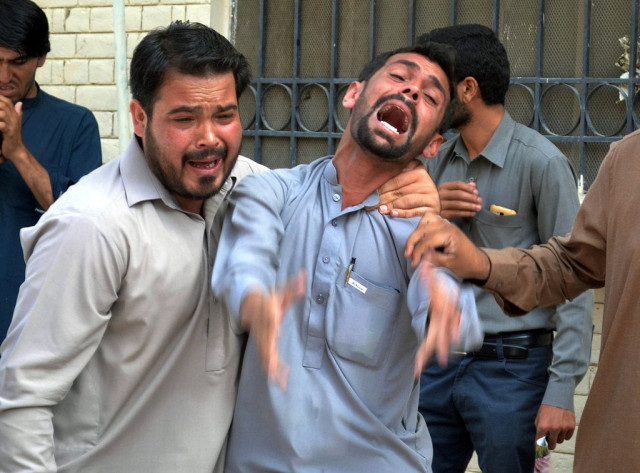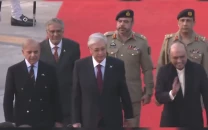Terror attack on Quetta’s lawyers throws city into judicial crisis
Of the 280 practicing lawyers in Quetta, 56 were killed and 92 were injured leaving many without legal aid.

Relatives mourn the dead outside Quetta hospital. PHOTO: AFP
Quetta weeps again
Abdul Hafiz is one such person. His young son Jalal remained in jail for four months because his lawyer was killed in the explosion and courts stopped working. “A fellow villager tried to illegally build a shop on our land and my son got into a fight with him. In such cases, court grants bail in the second or third hearing but my son languished in jail for so long because he didn’t have any legal aid,” Hafiz shares.
After hiring a new lawyer, the helpless father says, he got his son out of the jail and registered his case with a jirga to get swift justice.
Jirgas are seen as an easy source of justice as they require no money and the matter is resolved in a month or two. Headed by tribal elders and religious clerics, the jirgas base their decisions on consensus in the light of Islamic laws and local traditions. One of these is Balochistan Aman Jirga, which is made up of Pashtun, Baloch, Hazara and Punjabi elders in Quetta. It is currently working on 500 major and minor cases.
“After the explosion, a large number of people whose cases were in different courts came to us as we are providing free and quick justice,” Lala Yousuf Khilji, president of Balochistan Aman Jirga, tells The Express Tribune.
The Aman Jirga was established three years ago and the elders have solved 130 murder disputes in different parts of the province, especially in Pashtun districts, since then. “Recently, we resolved a dispute between two groups in Pishin District in which 30 people were murdered. Their cases had been in court for 21 years but we resolved it in just two months,” the president shares.
Crisis deepens
Fareedullah Khan, a lawyer at the Balochistan High Court, says the 56 lawyers that were killed in the blast were senior members and were managing 5,000 cases - which make up more than half of the total case load. “The deceased lawyers worked in 30 chambers, ten of which are now permanently closed. The cases were negatively affected as clients hired new lawyers who took a long time to understand the disputes,” he states. At least 300 people are stuck in jail on minor charges due to the delays in legal proceedings, Khan adds.
In pictures: Aftermath of Quetta suicide attack
The tragedy doesn’t stop there. In about 50 cases, lawyers from both sides were killed; many crucial documents were misplaced and bureaucratic procedures delayed gathering fresh copies of important records.
Speaking of lawyers who survived, Abdullah Kakar - a former Supreme Court Bar Association vice president - says there are at least 21 lawyers whose physical injuries have left them incapable of working on their cases. “The security situation has forced at least 15 lawyers to escape town and around 300 junior lawyers leave the profession completely; all lawyers want to leave Quetta, but they can’t due to financial limitations and lack of appropriate opportunities,” he says.
The judicial crisis, he states, has led to a decline in FIR registration as people are now settling issues out of court, mainly through jirgas which he estimates are hearing around one-fifth of the total court cases.
The terror attack which left scores dead and injured also caused hearing loss to many lawyers who were in the vicinity. Kakar says there are about 17 lawyers who either suffered permanent damage to their hearing or are losing it with each passing day.
Not everyone experiences the same problem and not everyone experiences it the same way. One lawyer who witnessed the deadly explosion from close range says his ears still ring today. "There is never any silence. I hear explosions all the time,” the lawyer says while requesting anonymity.
Way forward
Another lawyer, who also wished to remain anonymous, says the pending cases need at least 100 more experienced lawyers to begin proceedings. “The matter can be resolved if the government invites experienced lawyers from the rest of Pakistan to take up these cases,” he suggests.
Khan, the lawyer, adds that senior lawyers from other cities should also train law students and junior lawyers from lower courts in Quetta to take up the pending cases.
The government, however, has no immediate plans to address the problem at hand. “It is the responsibility of the chambers to hire lawyers from other cities for pending cases,” Balochistan government spokesperson Anwarul Haq Kakar tells The Express Tribune, adding that the government has decided to send young students and lawyers to foreign educational institutions for higher studies to fill the vacuum left after the deadly explosion.
“It is a five-year plan in which priority will be given to the family members of those affected by the blast. Recommendation for candidates will be made by Balochistan Bar Association and the provincial bench,” he shares.
Quetta hospital carnage: Judicial commission exposes chinks in anti-terror armour
On jirgas running a parallel justice system and strengthening in the wake of the lawyers killing, the provincial government spokesperson says in his personal opinion, jirgas should be legalised. Giving the example of English common law, he says it was a local dispute arrangement similar to jirga as it followed customs rather than the written laws.
“Today, we need to understand jirgas closely and carefully before we can raise the issue of legalising them in the provincial assembly because we have different political parties with varying thoughts in the government and the opposition,” he states.
Many clients agree that raising a new crop of lawyers will not solve the current problem and that legalising jirgas will be a step in the right direction. Jirgas, they say, are not just resolving matters but are doing so in less time and for free.
Hizbullah Khan is a freelance investigative journalist.



















COMMENTS
Comments are moderated and generally will be posted if they are on-topic and not abusive.
For more information, please see our Comments FAQ